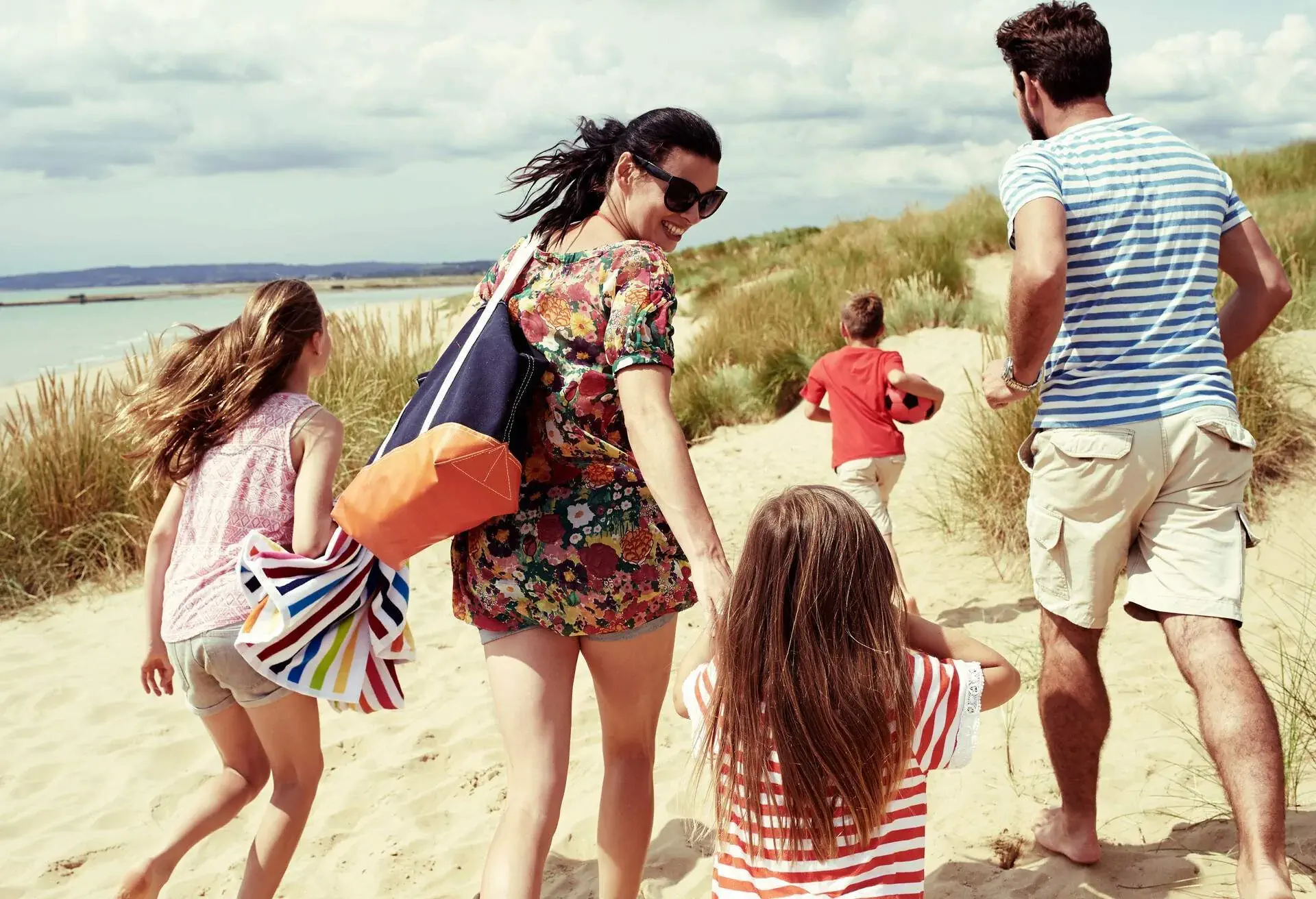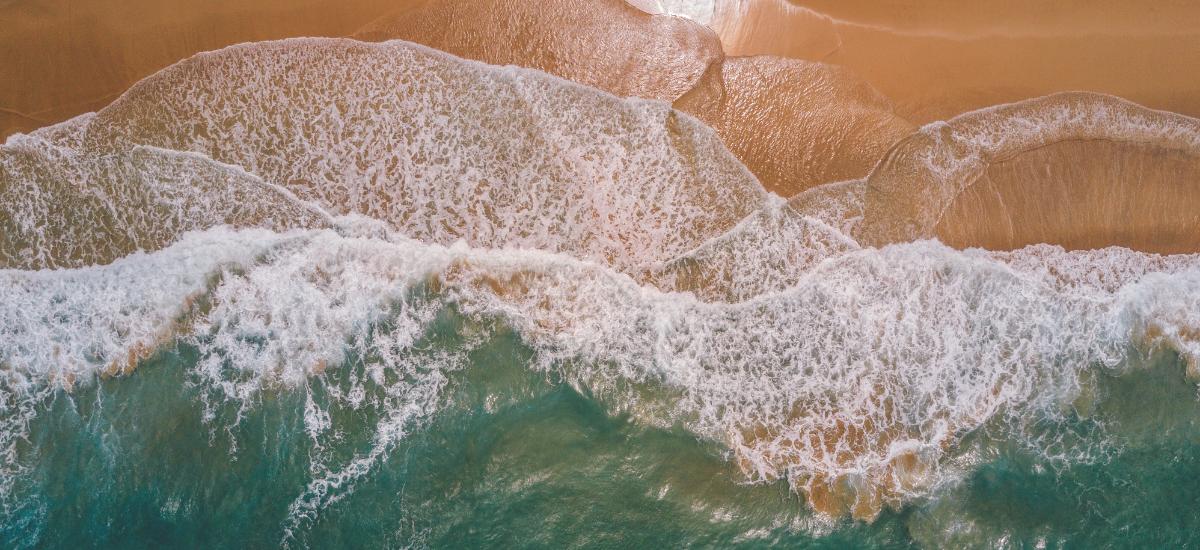When we try to make our holidays as eco-friendly as possible, it’s important to focus on the big things like mode of travel and type of accommodation. But have you ever thought about the environmental impact of what you bring with you for that sunny seaside sojourn? With some research and creativity, you can pack your beach bag in a more eco- and socially-responsible way, without compromising on the little joys that make your trip so special. Here are a few ideas to get you started.
Responsible tourism: Pack a picnic

Let’s start with the great classic of a summer holiday: a picnic at the beach. You can already see yourself there – the sun caressing your skin, wide-brimmed straw hats, and sand in absolutely everything… Rather than buying over-packaged supermarket picnic food, how about visiting the local market for fresh produce.
Most market vendors will be selling food free from plastic packaging, and you’ll likely be able to find fresh fruit, vegetables, cheese and meats that are produced and grown nearby, which also means you’ll be supporting the local economy. Don’t forget to pack a reusable bag!
Reusable everything!
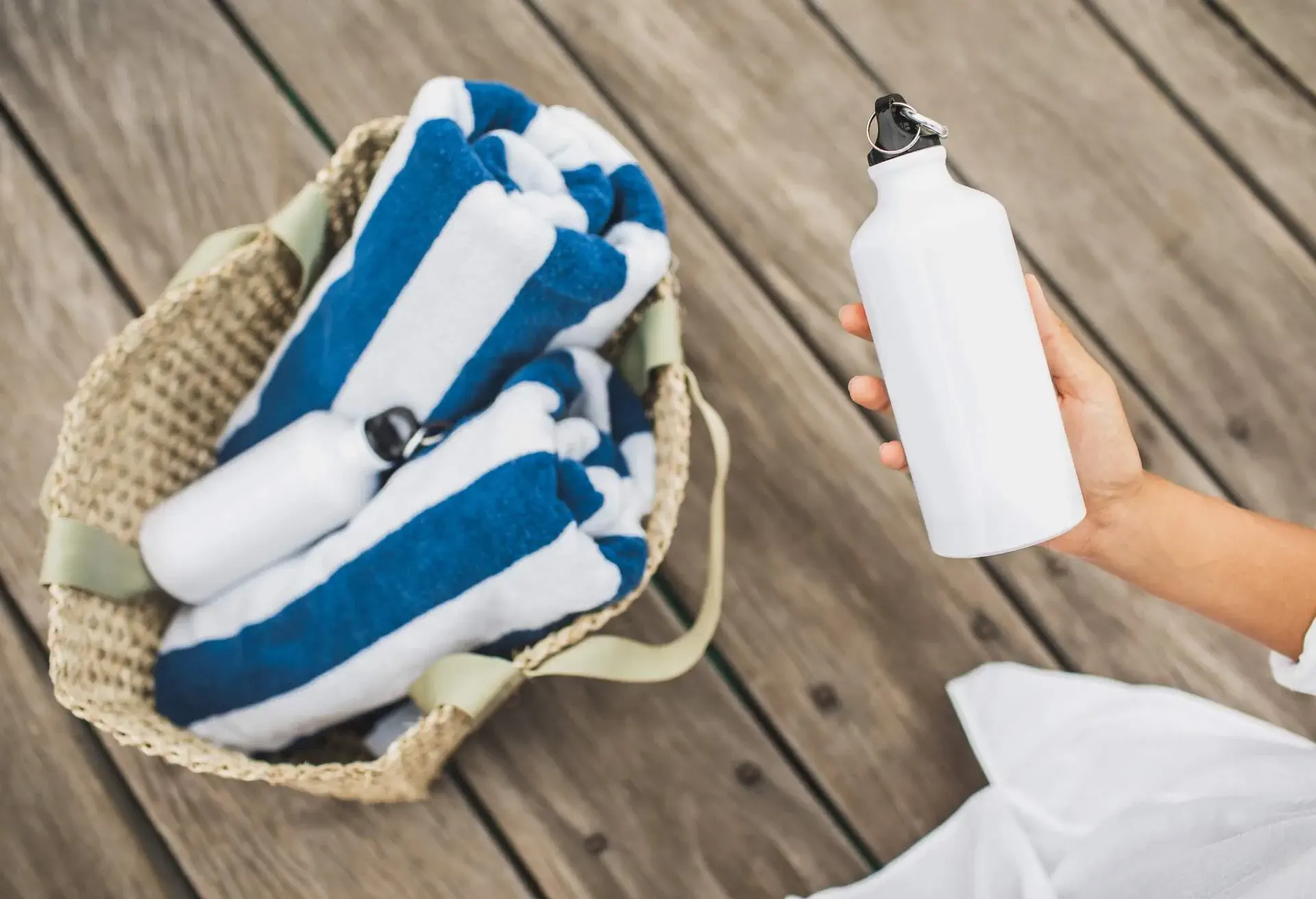
Once you’ve sourced your delicious spread, you’ll need something to lay it all out on at the beach. While paper napkins seem like the obvious choice, how about adding some cloth napkins to your beach bag which you can use several times before washing at home. The same goes for cups and cutlery – there are many options for easy-to-carry utensils that you can rinse off and put back in your bag for your next on-the-go feast.
To quench your thirst between swims, bring a reusable water bottle to the beach. If you don’t already have one, consider buying one made from recycled materials, or from a brand with a B-Corp certification, which lets you know that they focus on environmental and social performance.
Be kind to your skin and the earth

Suncream is an essential beach bag item, but it can be harmful to the environment – especially to coral reefs and sea life – due to the chemicals it contains. Suncream that contains mineral UV filters like non-nano zinc oxide are generally considered safe, but steer clear of creams that have oxybenzone and octinoxate on the labels. Did you know that in 2018, Hawaii actually banned the sale of sunscreens containing oxybenzone and octinoxate?
When you’re picking your suncream and other toiletries for the beach, though mini bottles are cute and tempting, consider filling up bottles you’ve got lying around from previous trips, or invest in refillable options to bring with you on every trip. If you’re feeling really creative, you can even make your own suncream to bring with you, but be sure to find one that will actually protect your skin from cancer-causing UVB and UVA rays. Ultimately, the best way to protect your skin from harmful rays is to stay out of the sun. Bring an umbrella and a wide-brimmed hat, and seek shade during the most intense hours of sun.
Turning the tide on plastic
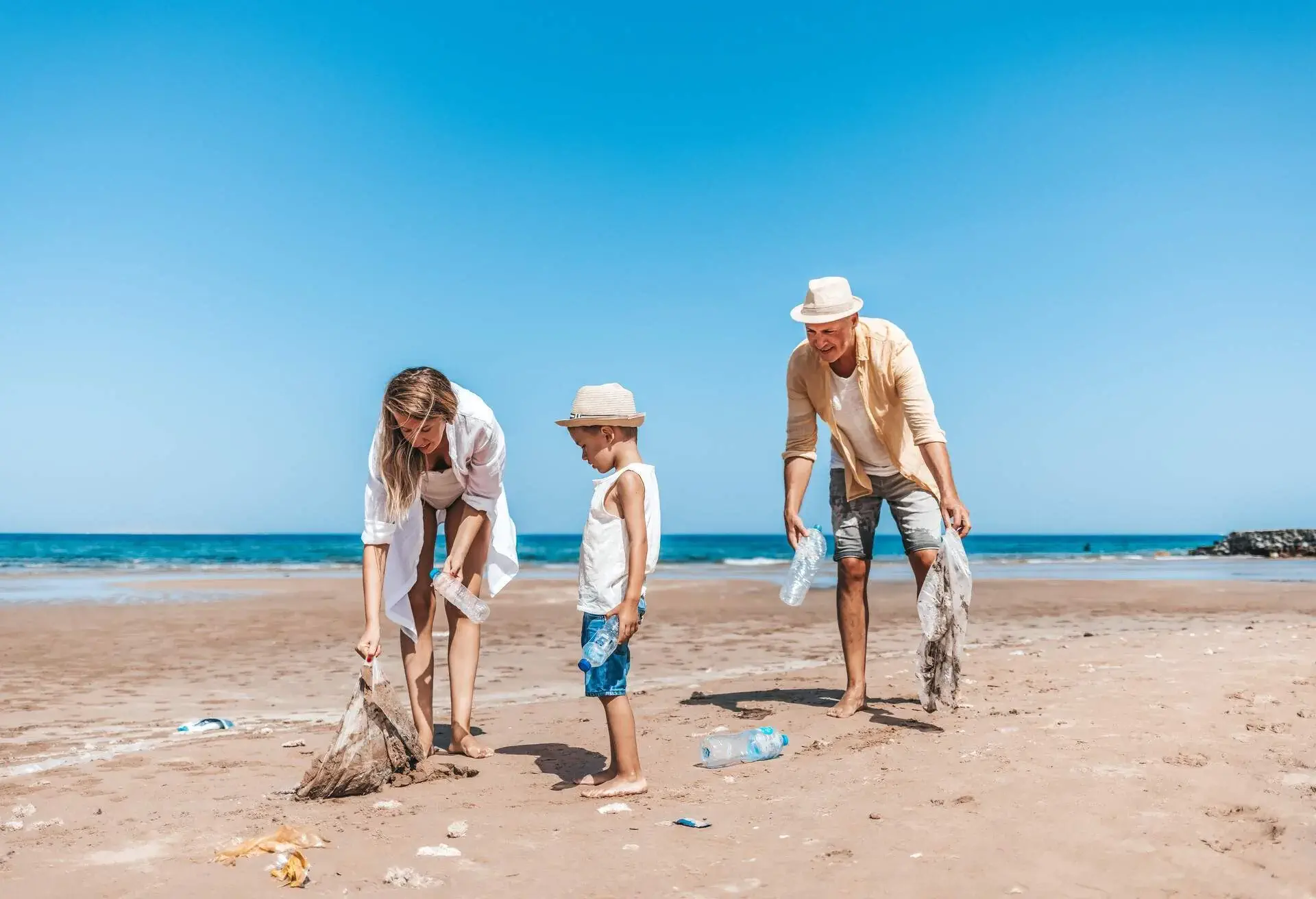
We’re sure we don’t have to tell you this, but plastic waste is pouring into the ocean, killing everything from coral to whales. In fact, 12 million tonnes of plastic makes its way into the water each year, and is found in every corner of our planet’s waters.
When you visit the beach, make sure to leave no trace. Every little thing you bring with you should leave with you – no exceptions. Collected your own litter? How about filling that rubbish bag up fully by doing a sweep of your surroundings and cleaning up other parts of the beach? This year, environmental charity Surfers Against Sewage launched its Million Mile Clean campaign, encouraging volunteers from across the UK to each clean 10 miles of land in 2022. When we act collectively, real change can happen. The charity says that in 2021, more than 20,000 volunteers removed more than 79,000kg of packaging pollution from across the wider south-west of England. Each small step makes a difference, so join the effort!
Read our article about reducing plastics while traveling here.
Friendly beach accessories
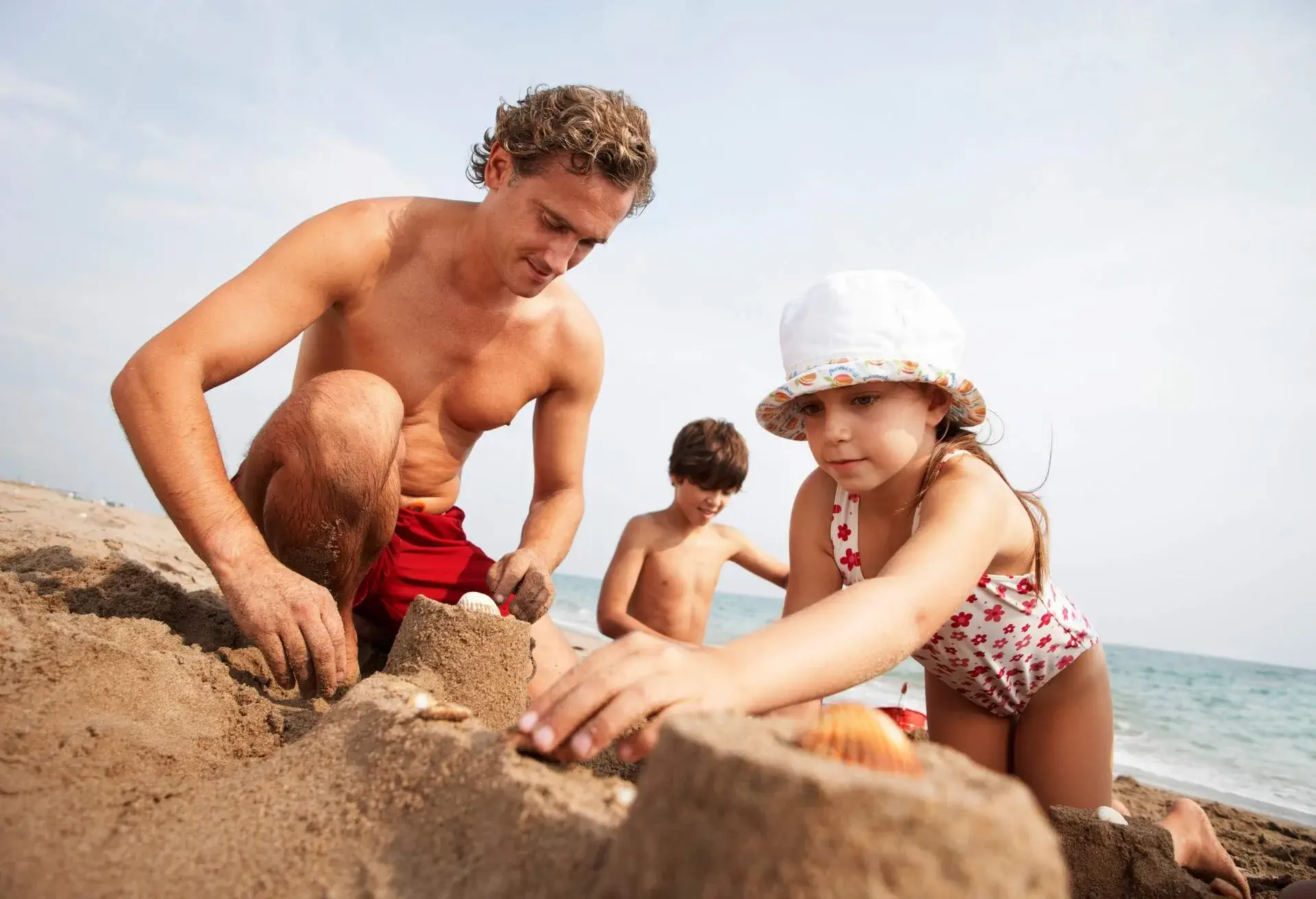
For a day or relaxation at the beach, you’re going to want a towel. Whether you’re constantly in and out of the waves, or you prefer to spend your time horizontal with a book in hand, you’re going to need something to dry off with or lie on. We’d recommend towels made of bamboo fibre for several reasons. First, they use far less water than cotton products while producing more oxygen for our planet. Second, they remain naturally odourless, even when damp, and third, they’ll dry you four-times faster than a cotton towel!
Your swimsuit can be sustainable too. More and more, brands are creating ways to clothe you using recycled materials. Cornish surf brand Finisterre use recycled ocean plastics to create some of their clothing, and they’ve just started the Wetsuits from Wetsuits scheme in which, you guessed it, they create wetsuits from your recycled wetsuits!
If you’re travelling with kids, you’re probably going to want some sort of bucket and spade to keep them busy. Rather than buying this new, why not pack some ice-cream tubs, tupperware, empty jars and other receptacles from home? These are bound for the recycling bin anyway, so why not put them to use first. If you’ve booked accommodation locally, maybe they have some beach toys you can borrow and return at the end of your stay.
What are you reading?

Do you love nothing more than reclining with a good story on the beach? An e-reader can be a convenient way of bringing books on holiday with you, reducing the bulk and weight of paper copies. But have you ever wondered if an e-reader is more eco-friendly than a stack of paper books? There are a few factors to consider.
Firstly, making a book means chopping down trees to produce paper. This includes bleaching, drying, cutting, glueing etc, which can be a water, chemical and energy-intensive process. Furthermore, trees store carbon, which when chopped down is released into the atmosphere. So does this mean that an e-reader is better?
Well, not exactly. Manufacturing electronic devices like e-readers also requires the extraction of natural materials like copper, lithium, and cobalt. One e-reader requires the extraction of 15kg of minerals, which often include traces of exotic materials that are mined in war-torn regions like the Democratic Republic of Congo. Furthermore, an e-reader also requires 79 gallons of water to produce its batteries and printed wiring boards, and to refine the metals in the circuits.
And of course, there’s energy needed to charge your e-reader, and storing and downloading e-books has its own carbon footprint. The answer isn’t clear cut, but the verdict seems to be that you have to be a pretty avid reader before the paper saving outweighs the emissions embodied in the e-reader (you’d have to read the equivalent of 36 books, to be precise).
If you’re still torn, you can reduce your carbon footprint by borrowing books or e-readers from your local library, and making sure to lend or donate books out once you’re done with them.
Only buy new if you need it
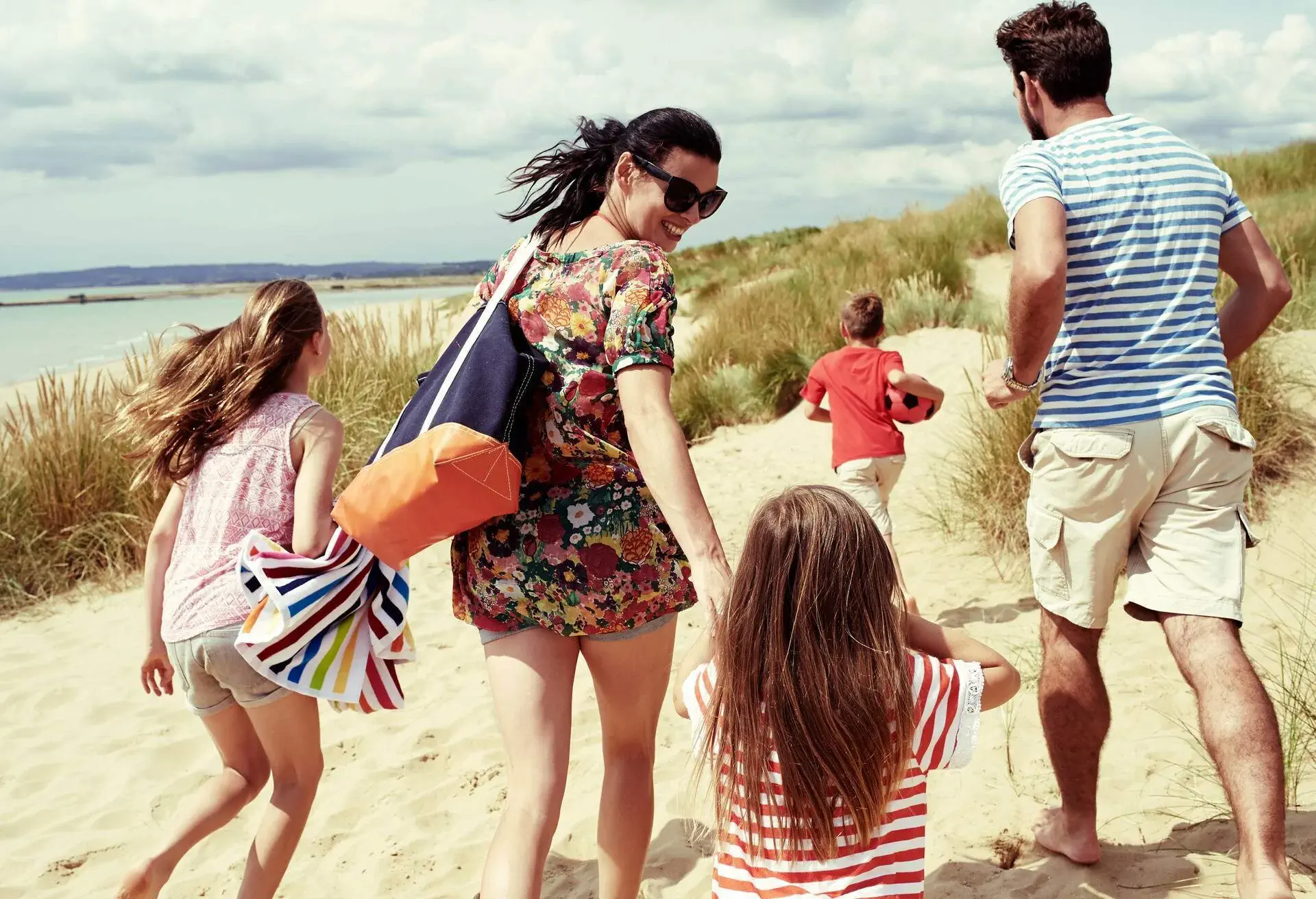
If you’re now thinking about every little thing in your beach bag, and considering whether it’s eco-friendly or not, heed our advice and only buy new if you really need it. Buying something new – even if it’s an environmentally-friendly version – is always going to be less sustainable than buying second hand, or keeping what you already have. Extending the life of an item will, without a doubt, be better than buying something new which takes energy and resources to produce.
Travelling to the beach
If you’ve lucked out on accommodation within walking distance to the sand, then bravo! If you’re further away, the temptation to take the car will be there, but don’t give in! Why not rent a bicycle or electric scooter to cruise down those sandy lanes, or maybe there’s a local bus that will take you there. Ask your hotel reception about how to get to the beach in the least polluting way!

